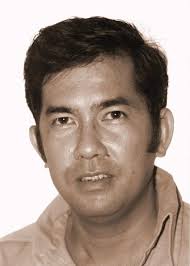Evelio B. Javier: A Filipino Patriot
THE EDITORIAL CHEESE
Patrick Petinglay Villavert
10/19/20252 min read
Evelio Bellaflor Javier (October 31, 1942 – February 11, 1986) was a prominent Filipino lawyer and politician whose life and ultimate sacrifice became a significant catalyst for the People Power Revolution that ended the Marcos dictatorship.
Early Life and Education
Evelio B. Javier was born on October 31, 1942, in Hamtic, Antique, to Everardo Autajay Javier, a prosecutor, and Feliza Bellaflor, a teacher. He completed his early education in Antique before attending the Ateneo de Manila University. There, he earned his Bachelor of Arts degree in History and Government and later his Bachelor of Laws in 1968. He passed the bar examination in the same year and briefly taught as a college professor at the Ateneo before entering politics. He married Precious Bello Lotilla in 1968, and they had two sons, Francis Gideon and David Ignatius.
Political Career and Opposition to Dictatorship
In 1971, at the age of 28, Javier ran for and won the governorship of Antique by one of the largest margins in history, making him the Philippines' youngest governor at the time. He served in this role from December 30, 1971, to January 30, 1980. Despite the declaration of martial law by President Ferdinand Marcos, Javier was prevailed upon by supporters to continue serving, recognizing the need for honest leadership.
In 1981, he declined to seek another term and instead attended the John F. Kennedy School of Government at Harvard University on a scholarship, where he earned a Masters in Public Administration.
After the assassination of Benigno Aquino Jr. in 1983, Javier returned to the Philippines and ran for a seat in the Regular Batasang Pambansa (parliament) in 1984 as an opposition candidate against a known Marcos ally, Arturo Pacificador. The campaign was marred by violence, including an ambush that killed seven of Javier's supporters. Although Pacificador was initially proclaimed the winner amidst accusations of massive election fraud, the Supreme Court eventually nullified the proclamation and posthumously declared Javier the true winner in September 1986, seven months after his death.
In the 1986 snap presidential election, Evelio Javier was a staunch critic of the Marcos administration and served as the provincial chairman for the UNIDO-Laban opposition party, campaigning for Corazon Aquino and her running mate, Salvador Laurel.
Assassination and Legacy
On February 11, 1986, just days after the snap elections were held, Evelio Javier was fatally shot by masked gunmen in broad daylight near the provincial capitol building in San Jose de Buenavista, Antique, where election returns were being canvassed. The assassination, which followed a dramatic chase across the capitol grounds, was widely blamed on his political rivals and the brutality of the Marcos regime.
His brutal murder, which came shortly after the contested election and in the context of mounting public discontent, was a final tipping point that helped fuel the People Power Revolution later that same month. Javier's body was flown to Manila, where it lay in state and served as a powerful rallying point for the anti-Marcos forces. His death is commemorated every year on February 11, which is a special non-working public holiday in the provinces of Antique, Capiz, Aklan, and Iloilo. He has also been formally identified as a human rights violations victim of the Martial Law Era.


